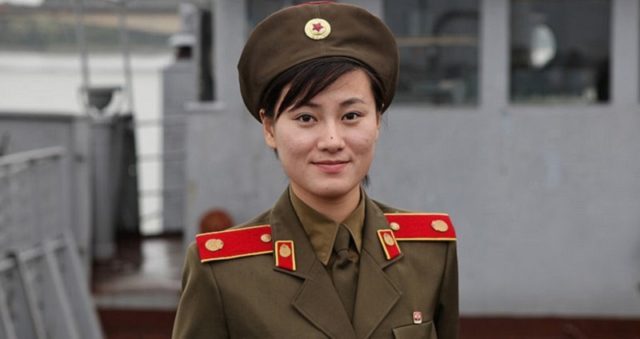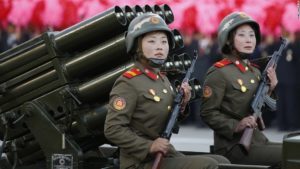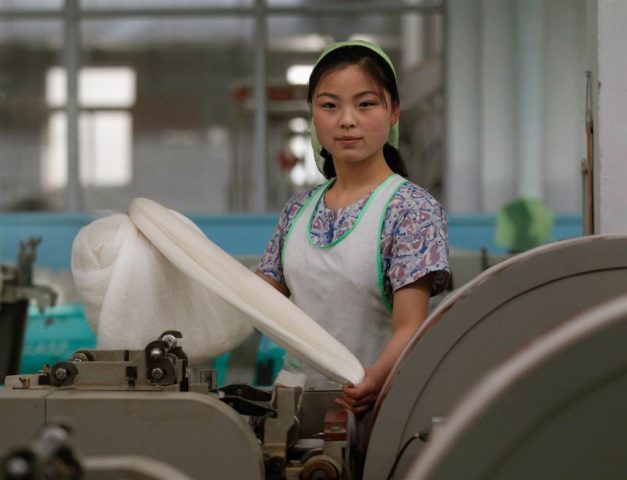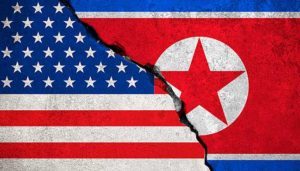“We were really sweating. The mattress where we slept was made of rice husk, so the mattress was impregnated with all the body odor. It is not made of cotton. Since it was rice husk, the smell of sweat and other things stays there. It is not very nice”, she starts her story. For 10 years, Lee So Yeon slept in a bunk in a room she shared with about 30 women.
She still remembers the smell of the concrete barracks and the human secretions of the internment. That smell, however, was no big deal compared to what female soldiers of the Armed Forces of North Korea had to live.

Certainly, 10 years ago, So Yeon stopped being part of the 4th largest army in the world, in which the conditions were so harsh that their women stopped having menstruation, and rapes were one more thing in daily life. “As a woman, one of the hardest things was that you could not shower properly because there was no hot water”, Lee So said in a report to the British Broadcasting Company (BBC). “They connected the hose to a mountain stream and the water came directly from there. Frogs and snakes entered through the hose”.
So Yeon, now 41 years old, is the daughter of a university professor and grew up in the north of the country. She enlisted voluntarily, thinking she would have food secured every day when the famine devastated North Korea in the 1990s.
In addition, many men in her family had been soldiers. When she 1st arrived at the camp, she entered the dining room and saw an extensive menu posted on the wall. “It was brilliant,” she said in an interview with The World. “Meat, tofu and those little rice cakes, and it changed throughout the week. I thought, ‘Oh, this is Thanksgiving every day!’ “.
But the menu was a sham. “Actually, we only got rice bowls with a little corn, over and over again. Nothing tasty at all. Only on the birthdays of Kim Il-sung and Kim Jong-il, we could get some meat and some sweets. Lee used to escape to nearby apple orchards to fill her stomach with fruit. “I was always hungry”, she recalls.
Her beginnings. Lee So now works against the regime for which she once served. She is the president of the New Korean Women’s Union, a women’s defector organization dedicated to exposing North Korea’s abuses against women. “The famine resulted in a particularly vulnerable period for women in North Korea,” Jieun Baek, author of the book ‘The Hidden Revolution of North Korea’ told the BBC. “More women had to go to work and more were subject to abuse, specifically sexual harassment and violence”.
Animated by a patriotic feeling and collective work, being a 17-year-old adolescent, she began her work for the Armed Forces. Lee belonged to an all-female military division in the south of Hwanghae province, an area west of North Korea between Seoul and Pyongyang.

Her job was to transmit the coordinates sent from the 1st line soldiers to the officers who operated artillery targeting South Korea. “I was in charge of these guns,” Lee told The World. “Then, if the war broke out, the women would go to South Korea, select targets, and I would guide our guns to reach these coordinates”.
The indoctrination towards the regime was absolute. While she slept, next to her bed and on her uniform, they all kept 2 photographs: one of the North Korean founders, Kim Il-sung, and another of his deceased heir, Kim Jong-il.
Her routine was not very different from that of the male soldiers. Those women had slightly shorter training regimens but were obliged to carry out tasks such as cleaning or cooking, tasks reserved only for women.
“North Korea is a traditional society dominated by men and traditional gender roles continue”, says Juliette Morillot, author of ‘North Korea in 100 Questions’. “Women are still ttukong unjeongsu, which translates literally as ‘kitchen pot lid drivers’, and means they should ‘stay in the kitchen, where they belong’ “.
Her body and that of her fellow recruits began to succumb to the heavy training. “After 6 months to 1 year of training we stopped having menstruation, due to malnutrition and the stressful environment”, the nowadays activist told the BBC. “The female soldiers said they were happy for not having their periods. They said they were happy because the situation was so bad that having their periods would have made it even worse”.
During the time she was among the ranks of the army, the military institution did not have provisions for menstruation, so the only option for them was to reuse sanitary napkins. “Women to this day still use traditional white cotton wipes”, adds Morillot. “They have to be washed every night, away from the sight of men, so women get up early and wash them”.
The writer is witness to this misery. In a recent visit she talked with several female soldiers and confirmed that, in effect, they frequently stop having menstruation. “One of the girls I spoke with, who was 20 years old, told me that she trained so much that she had not menstruated for 2 years”, she says.
Following the allegations, the government took the unusual step to say that it was distributing a quality brand of women’s health products called Daedong. “It may have been a way to repair the conditions of the past,” says Baek. “It may have been a way to increase morale, and for more women to think that they are taking care of them”.
Martyrdom in the militia. Although Lee So Yeon joined the army voluntarily, in 2015 the situation in North Korea changed. The news was given that all the women of this nation must now do 7 years of military service since 18 years old, and men 10 years. The Asian country has placed itself at the top of the longest mandatory military services in the world.
According to data from the BBC, it is estimated that 40% of women between 18 and 25 years wear uniforms, a figure that is expected to grow after the obligation established 2 years ago. The North Korean government assures that 15% of the budget is dedicated to military expenses, although centers of analysis estimate that the number is much greater and that could reach up to 40%.
Sexual abuse. Sexual harassment and abuse is also part of their daily life. According to Marillot, when she mentioned the issue of violations, most female Korean soldiers with whom she spoke assured that it had happened to others. None accepted to have experienced it in their own flesh.
“The commander of my company stayed late in his room at the unit, and he used to rape the female soldiers who were under his command. This happened again and again, without end”, said Lee So Yeon. She claimed not to have been raped during her time in the army between 1992 and 2001, but many of her colleagues did. The official position of the army is to take sexual abuse seriously. “But most times nobody wants to testify. So very often men are not punished”, says Morillot.
Silence, as in everything, has its roots in the patriarchal attitudes of Korean society, says the author. These attitudes are also responsible for female soldiers being in charge of domestic tasks. “Domestic violence is still widely accepted, and it is not reported, so the same thing happens in the army”, she adds. “But I insist, also on the fact that the same kind of culture (of harassment) exists in the South Korean army”.

Beyond the confinement. Lee So Yeon left the army at the age of 28, also voluntarily. She was happy to be able to spend more time with her family, but she was not ready for life outside the army. Then her income diminished considerably.
In her 1st escape attempt, in 2008, she decided to go to South Korea but was caught on the border with China. As a result, 1 year of internment was her punishment. On the 2nd one, a year after leaving prison, she swam the Tumen River and crossed into China. There she met with an intermediary who managed to make her reach South Korea.
In a tense political and military context between the United States of America and North Korea, So Yeon assures that hatred towards Americans was a job requirement. “They taught us that Americans are jackals and devour all other creatures. Americans are also vampires”, Lee said for The World. “Oh, and they were barbarians, too”.

In consequence, they learned to hate the United States. “Why were we so poor? Why do we only get new clothes every 2 years? Why were we always hungry? It is because of the United States”, she said. “How could we deal with this? We had to kill them with our weapons. We talked about that all the time. Even in normal life, when we argued, we said to people: ‘You! You are acting like an American right now! You are such a terrible Yankee! ‘ “.
In their context, those phrases were normal. But when she arrived in Seoul and continued to use them, people started looking at her with surprise. After all, they were not so well understood. As for disputes between countries, Lee adds, Americans should not let North Korea’s leadership spill aversion over all citizens, since they live under their despotic control.
“I know that Kim Jong-un has threatened peace in the United States”, Lee said. “But these soldiers are also human beings. They simply follow the rules and live in extreme poverty. There is no reason to hate them. They just have no other option”, she finished.
